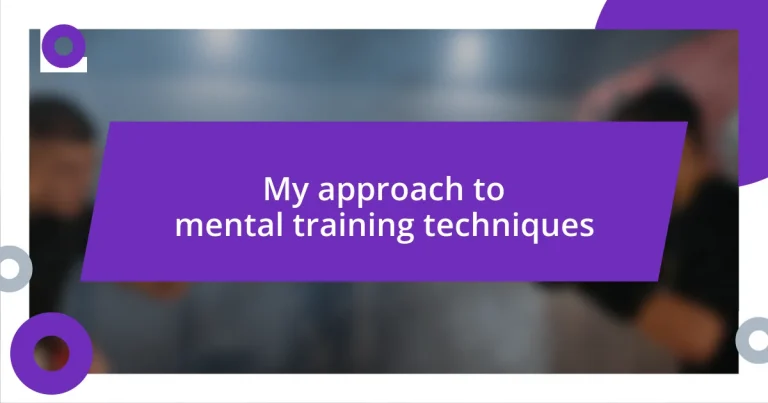Key takeaways:
- Mental training techniques, such as visualization, mindfulness, and positive self-talk, enhance focus, resilience, and emotional control, leading to improved performance and personal growth.
- Common techniques include guided imagery for stress reduction, journaling for self-reflection, and breathing exercises to manage anxiety and regain mental clarity.
- Progress in mental training can be measured through self-reflection, self-assessments, and feedback from others, helping to acknowledge growth and maintain motivation.
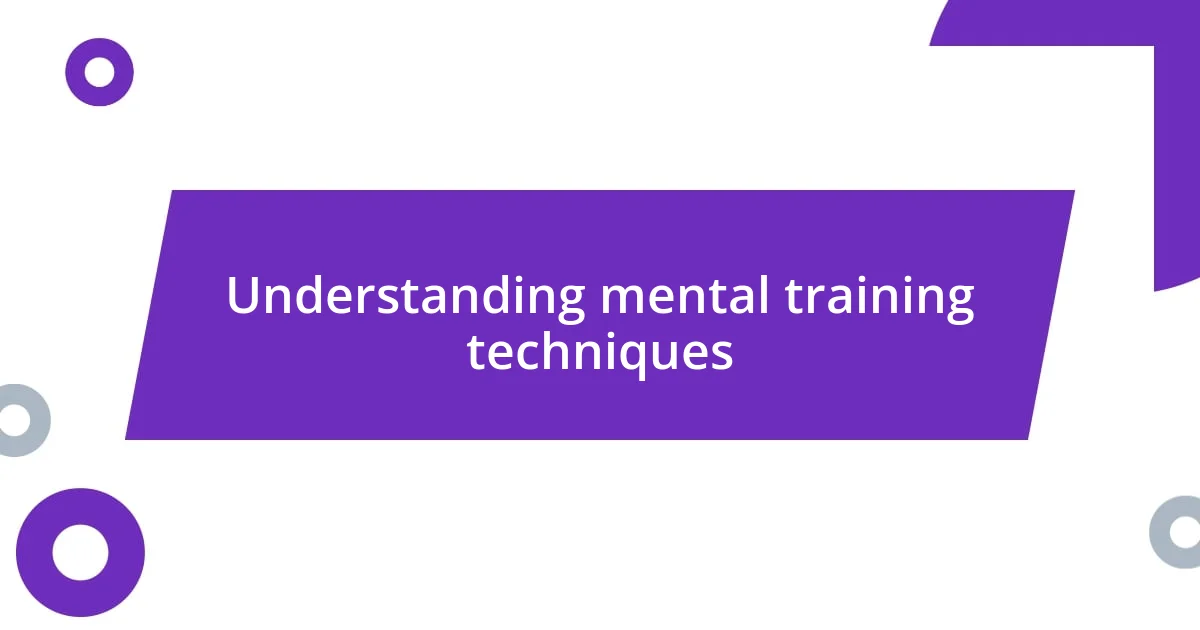
Understanding mental training techniques
Mental training techniques serve as mental exercises that help enhance focus, resilience, and emotional control. I remember when I first started practicing visualization; it felt odd to picture my goals vividly, but over time, I realized that this technique sharpened my clarity in tackling challenges. Have you ever noticed how visualizing success can create a pathway in your mind that makes those goals feel more attainable?
Another fascinating aspect of mental training is the role of mindfulness. Engaging in mindfulness exercises taught me to embrace the present moment rather than dwelling on past failures or future worries. This shift transformed my approach to stress—turning what once felt overwhelming into a more manageable experience. Have you ever tried to simply observe your thoughts without judgment? It’s surprising how liberating that can be.
Moreover, techniques like positive self-talk have been game-changers for me. I recall a particularly tough day when I replaced negative thoughts with affirmations. The difference it made in my day was profound; I felt empowered and capable, ready to face whatever lay ahead. Isn’t it incredible how the words we say to ourselves can wield such influence over our mindset and performance?
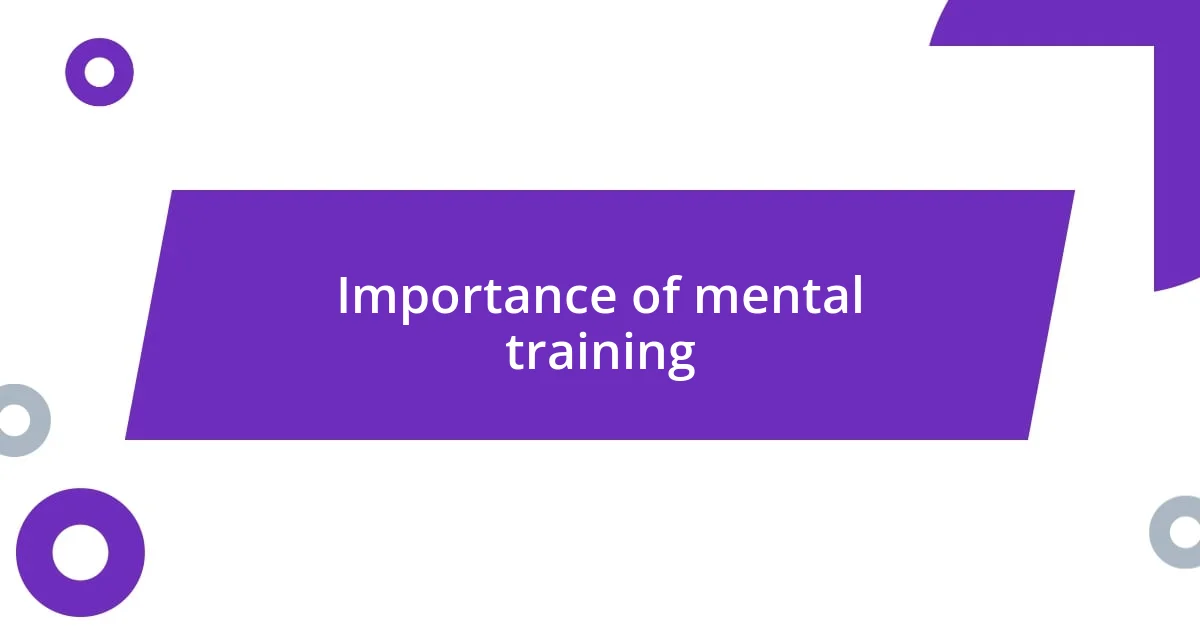
Importance of mental training
Mental training is crucial because it lays the groundwork for peak performance and personal growth. I once participated in a high-pressure competition where the mental aspect was just as important as the physical preparation. I found that the hours spent honing my mental skills paid off immensely when I faced setbacks during the event. I learned that cultivating a strong mental state not only enhances performance but fosters resilience in the face of adversity.
Consider these key reasons why mental training is so vital:
- Focus and Concentration: Mental exercises can sharpen your ability to concentrate, allowing you to fully engage with tasks at hand.
- Emotional Control: By practicing techniques like breathing exercises, I’ve developed a better grip on my emotions, which helps prevent anxiety from clouding my judgment.
- Resilience: Mental training builds the capacity to bounce back from setbacks, enabling you to handle challenges more effectively.
- Improved Decision-Making: Techniques like visualization have helped me weigh my options better, leading to more informed and confident decisions.
- Enhanced Self-Awareness: Engaging with my thoughts and feelings through mental training has deepened my understanding of my motivations and triggers, paving the way for personal improvement.
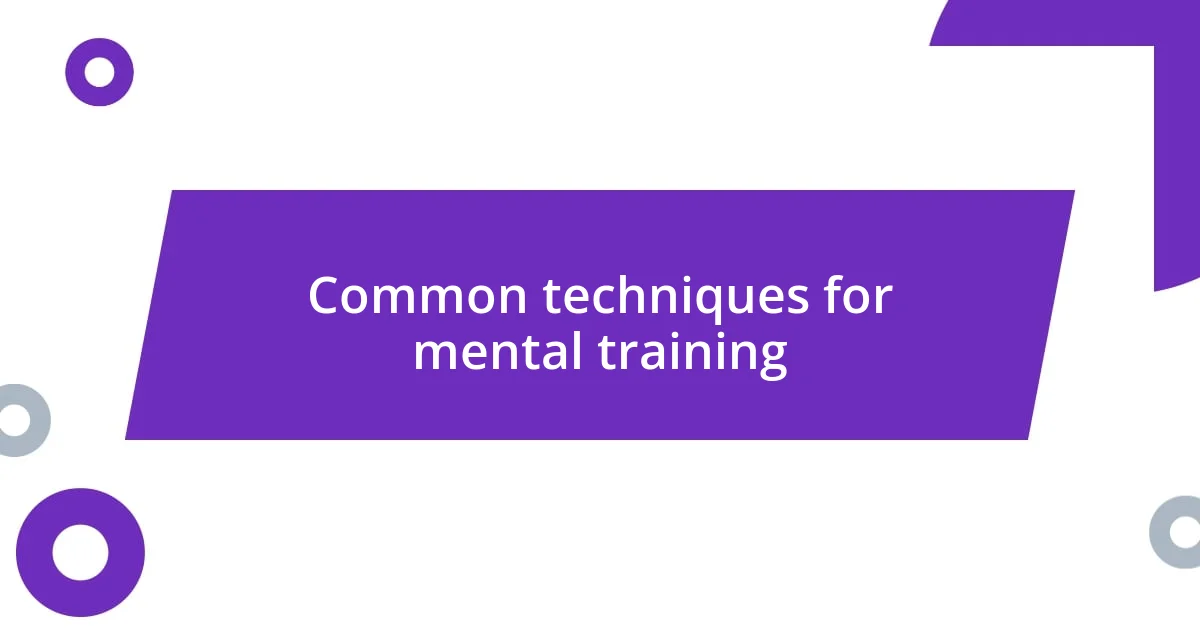
Common techniques for mental training
Mental training encompasses several effective techniques that can truly transform our mental landscape. One of my favorites is guided imagery, where I close my eyes and immerse myself in a peaceful scene. This practice does wonders for reducing stress; I often picture a serene beach, and it transports me away from daily chaos. Have you ever tried simply allowing your mind to drift to a happy place? It can be so refreshing.
Journaling is another technique I swear by. Writing down my thoughts not only helps in organizing my feelings but also serves as a powerful form of self-reflection. I often find clarity about my emotions when I put pen to paper, allowing me to navigate through any mental clutter. Have you ever considered how journaling could help you untangle your thoughts? It’s a personal journey that often unveils surprising insights.
Lastly, I can’t mention mental training without highlighting the importance of breathing techniques. Focusing on my breath has been a lifeline during stressful moments. When things get overwhelming, taking a few deep breaths grounds me. I remember a day filled with demanding tasks; just a few minutes of breath work helped me regain control. Don’t you think that something so simple can have such profound effects on your mental state?
| Technique | Description |
|---|---|
| Guided Imagery | A mental exercise involving visualization of serene scenes to reduce stress. |
| Journaling | Writing down thoughts and feelings to achieve clarity and self-reflection. |
| Breathing Techniques | Focus on deep breathing to manage stress and regain mental control. |
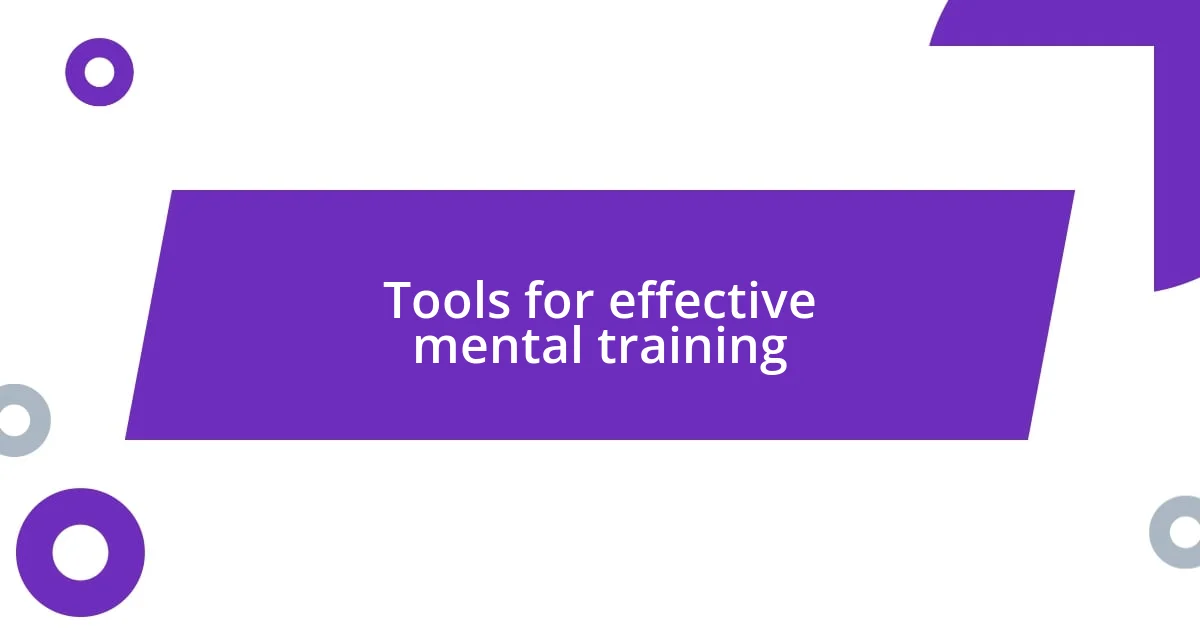
Tools for effective mental training
I’ve discovered that incorporating apps designed for mental training can elevate my practice to a new level. For instance, there’s a mindfulness app that sends me daily reminders to pause and breathe, which I find incredibly beneficial during hectic days. Have you ever noticed how a gentle nudge can shift your entire perspective? That little reminder often creates the space I need to refocus.
Another tool I swear by is mental rehearsal. Before a big presentation, I visualize every aspect of the experience, thinking through potential questions and my responses. This method not only calms my nerves but also boosts my confidence. It’s fascinating to think about how vividly imagining success can translate into real-life performance, isn’t it?
Lastly, using physical tools like stress balls or fidget spinners has surprisingly helped me maintain mental clarity. When my thoughts feel scattered, squeezing a stress ball feels like letting go of tension, freeing up mental space. Have you ever tried engaging with a simple physical object to refocus your mind? It’s a small yet remarkable shift that underscores how interconnected our physical state is with our mental well-being.
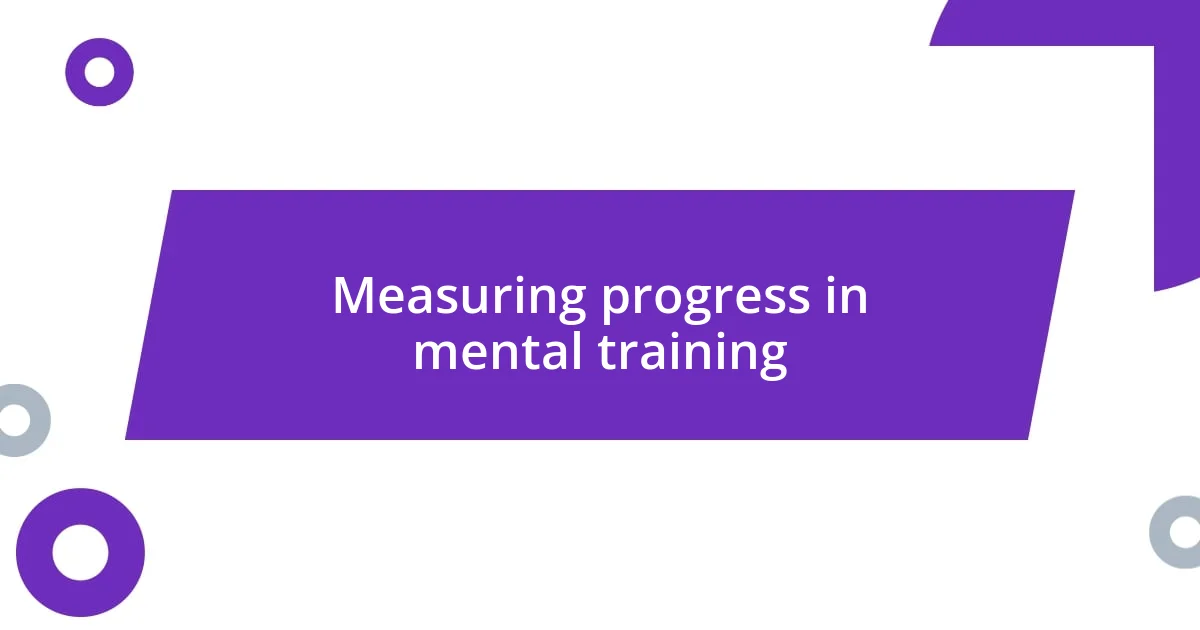
Measuring progress in mental training
Tracking progress in mental training requires a combination of self-reflection and tangible metrics. I’ve found that maintaining a simple journal has been invaluable in this respect. Every week, I jot down my feelings and the techniques I practiced, allowing me to spot patterns and improvements over time. Have you ever noticed how acknowledging small victories can propel your motivation?
Another effective approach I’ve embraced is the use of self-assessments. Periodically, I gauge my stress levels or focus through quick quizzes or mindfulness scales, which really helps in evaluating my mental state. It’s enlightening to see how certain tools can provide a snapshot of where I stand in my training journey. Wouldn’t you agree that a clearer understanding of your progress can give you the confidence to push further?
Lastly, feedback from trusted friends or mentors plays a vital role in measuring my growth. When I share my experiences and techniques, their insights often illuminate progress I might overlook. It’s fascinating how an outside perspective can help me recognize my evolution. Have you ever thought about how external validation can reinforce the progress we feel deep inside?
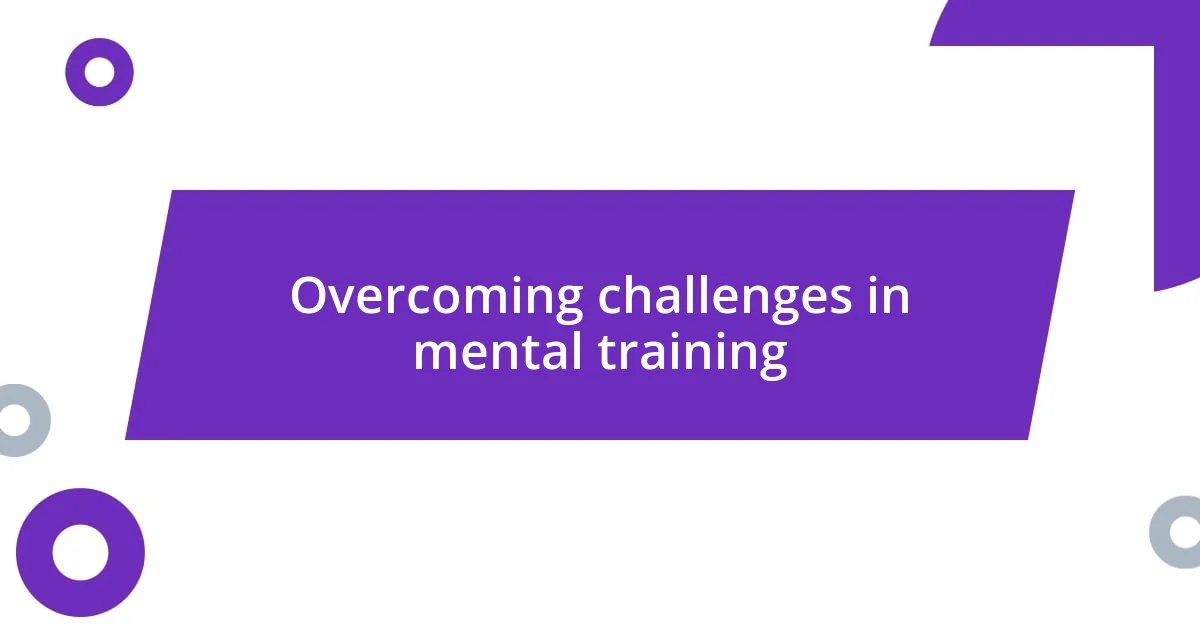
Overcoming challenges in mental training
Mental training can often feel like a roller coaster. There are days when I’m fully engaged, and everything seems to click, but then there are moments when self-doubt creeps in, making it hard to continue. Have you felt that ebb and flow? I’ve learned to embrace these challenges by practicing self-compassion; I remind myself that setbacks are part of the growth experience, not an indication of failure.
I remember a time when I was preparing for a major event, and my anxiety peaked right before it. I sat there, feeling overwhelmed, but instead of succumbing to panic, I decided to take a step back and re-center. That’s when I discovered the power of grounding techniques, like focusing on my breath or identifying five things in my environment. It was remarkable how refocusing my attention shifted the narrative from anxiety to empowerment. Isn’t it amazing how simple strategies can unravel the complexities of our emotions?
Integrating challenges into my routine has also been a game-changer. For instance, I often intentionally put myself in uncomfortable situations, such as giving impromptu speeches. Each experience forces me to confront my fears head-on. Over time, I’ve noticed that leaning into discomfort strengthens my resilience. Have you ever challenged yourself in a way that felt daunting at first but later became a source of strength? Embracing those moments is where I find both growth and clarity.












